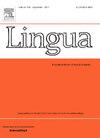Perceptions of impoliteness in Twitter interactions: Evidence from Spanish Heritage speakers
IF 1.3
3区 文学
0 LANGUAGE & LINGUISTICS
引用次数: 0
Abstract
This study investigates U.S. Spanish Heritage speakers’ perceptions of impoliteness in the Twitter feed of the Academia Mexicana de la Lengua. By combining first- and second-order approaches to (im)politeness, I argue that heritage speakers’ perceptions of impoliteness must be studied at the individual level to understand their expectations of how particular behaviors should occur in digital communication settings. I collected 28 reactive tweets representing either on-record or off-record impoliteness strategies. Using a five-point scale survey, 20 participant-evaluators rated the impoliteness of each tweet and provided metapragmatic comments to support their ratings. A mixed-methods analysis of the data revealed commonalities within groups regarding politeness norms (e.g., on-record strategies) and highlighted heritage speakers’ varying levels of tolerance to impoliteness in this medium. This variation revealed participants’ orientations and expectations at the individual level, especially when confronting off-record impoliteness. Focusing on Spanish Heritage speakers, the findings suggest that analyses of perceptions of politeness norms in social media interactions must incorporate both lay understandings and researchers’ conceptualizations to reflect expectations of impoliteness at the individual level, which are likely influenced by community norms.
推特互动中不礼貌的感知:来自西班牙传统演讲者的证据
这项研究调查了美国西班牙语传承者在墨西哥学院的推特上对不礼貌的看法。通过结合一阶和二阶(非)礼貌的方法,我认为必须在个人层面上研究传统说话者对不礼貌的看法,以了解他们对数字通信环境中特定行为应该如何发生的期望。我收集了28条反应性推文,这些推文代表了公开或不公开的不礼貌策略。使用五分制调查,20名参与者评估者对每条推文的不礼貌进行评级,并提供元实用主义的评论来支持他们的评级。对数据的混合方法分析揭示了群体内关于礼貌规范的共性(例如,记录策略),并强调了传统说话者在这种媒介中对不礼貌的容忍程度的不同。这种差异揭示了参与者在个人层面上的取向和期望,尤其是在面对非正式的不礼貌行为时。研究结果表明,对社交媒体互动中礼貌规范的看法的分析必须结合外行人的理解和研究人员的概念化,以反映个人层面对不礼貌的期望,这可能受到社区规范的影响。
本文章由计算机程序翻译,如有差异,请以英文原文为准。
求助全文
约1分钟内获得全文
求助全文
来源期刊

Lingua
Multiple-
CiteScore
2.50
自引率
9.10%
发文量
93
审稿时长
24 weeks
期刊介绍:
Lingua publishes papers of any length, if justified, as well as review articles surveying developments in the various fields of linguistics, and occasional discussions. A considerable number of pages in each issue are devoted to critical book reviews. Lingua also publishes Lingua Franca articles consisting of provocative exchanges expressing strong opinions on central topics in linguistics; The Decade In articles which are educational articles offering the nonspecialist linguist an overview of a given area of study; and Taking up the Gauntlet special issues composed of a set number of papers examining one set of data and exploring whose theory offers the most insight with a minimal set of assumptions and a maximum of arguments.
 求助内容:
求助内容: 应助结果提醒方式:
应助结果提醒方式:


